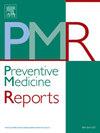秘鲁委内瑞拉移民对户主歧视的看法和家庭粮食不安全:基于人口的调查的横断面分析
IF 2.4
3区 医学
Q2 PUBLIC, ENVIRONMENTAL & OCCUPATIONAL HEALTH
引用次数: 0
摘要
目的评估居住在秘鲁的委内瑞拉移民和难民家庭中,户主对歧视的感知与存在中度至重度粮食不安全之间的关系。方法对2022年在秘鲁委内瑞拉居民调查(ENPOVE,西班牙语首字母缩写)的二级数据进行分析。该分析包括3491名委内瑞拉移民家庭的户主。暴露变量是户主自抵达秘鲁以来感受到的歧视(是/否),结果是在过去30天内家庭中存在中度至严重的粮食不安全(是/否),用粮食不安全体验量表进行测量。估计校正患病率以评估兴趣的相关性,并对潜在的混杂变量进行校正。结果在所有参与者中,35.6%的人在抵达秘鲁后感受到歧视;同样,39%的家庭存在中度至严重的粮食不安全状况。家庭户主对歧视的感知与家庭中出现中度至重度粮食不安全的更大可能性相关(调整患病率:1.29;95%置信区间[CI]: 1.17-1.42)。结论:居住在委内瑞拉的移民和难民户主对歧视的看法与出现中度至重度粮食不安全的可能性较大有关。需要采取紧急措施来缓解这一问题,这将潜在地影响我国的粮食和社会经济不平等。本文章由计算机程序翻译,如有差异,请以英文原文为准。
Perception of discrimination by the head of the household and household food insecurity in Venezuelan migrants in Peru: Cross-sectional analysis of a population-based survey
Objectives
To evaluate the association between the perception of discrimination by the head of the household and the presence of moderate to severe food insecurity in the households of Venezuelan migrants and refugees residing in Peru.
Methods
Secondary data analysis of the Survey Directed at the Venezuelan Population Resident in Peru (ENPOVE, for its acronym in Spanish) 2022. The analysis included 3491 migrant Venezuelan family heads. The exposure variable was discrimination perceived by the head of the household (yes/no) since arriving in Peru and the outcome was the presence of moderate to severe food insecurity in the household (yes/no) in the last 30 days, measured with the Food Insecurity Experience Scale. Adjusted prevalence ratios were estimated to evaluate the association of interest, adjusted for potential confounding variables.
Results
Of the total participants, 35.6 % had perceived discrimination since arriving in Peru; Likewise, 39 % of households presented moderate to severe food insecurity. The perception of discrimination by the head of the household was associated with a greater probability of presenting moderate to severe food insecurity in the home (adjusted prevalence ratio: 1.29; 95 % confidence interval [CI]: 1.17–1.42).
Conclusions
The perception of discrimination among Venezuelan migrant and refugee household heads residing in the country is associated with a greater probability of moderate to severe food insecurity. Urgent measures are required to mitigate this problem which will potentially affect food and socioeconomic inequality in our country.
求助全文
通过发布文献求助,成功后即可免费获取论文全文。
去求助
来源期刊

Preventive Medicine Reports
Medicine-Public Health, Environmental and Occupational Health
CiteScore
3.90
自引率
0.00%
发文量
353
 求助内容:
求助内容: 应助结果提醒方式:
应助结果提醒方式:


